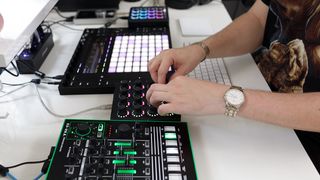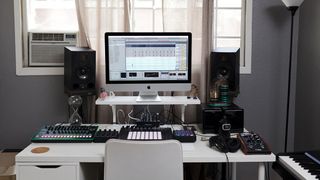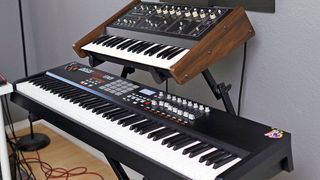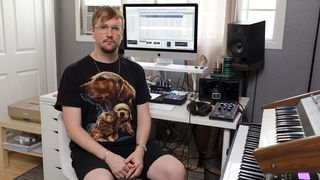Despite his acoustic background playing guitar and djembe in an African ensemble, it was a hand-me-down PC and a copy of Cakewalk that really fired Travis Stewart's imagination. By the tender age of 19, Machinedrum was born, prior to Stewart's first release on Merck Records under the pseudonym Syndrone.
In the ten year period from 2001-2010, Stewart released eight albums and 20 remixes, plus collaborations with controversial singer/songwriter Azealia Banks and techno producer Jimmy Edgar as Jets. Originally a hip-hop/jungle crossover, Stewart has successfully evolved Machinedrum's sound into evocative, textural glitch, bursting with rich, syncopated patterns and fragmented vocals.
Tell us about your upbringing…
"I grew up in North Carolina - in Hickory mostly. There was a piano in the house but I never took any lessons and learned to play by ear. I'd listen to songs on the radio and try to pick out the melody. My grandpa was, and still is, in a country music band - he plays the pedal steel. I used to go to his house as he had a little studio and rehearsal space. I would play around with his guitars and he had a little drum machine and effects pedals."
I subscribed to Future Music when I was in high school and would obsess over people's set-ups, but at the same time I didn't have a lot of money so I had to work within my means."
Was that your first introduction to the world of electronic music?
"He only had the drum machine so he'd have some sort of rhythm to practise to, but of course I started plugging it into effects pedals and recording to tape - messing around with whatever I could get my hands on really. This was between eight and ten years old; I think I made a song about my babysitter [laughs].
"My parents obviously took notice of my interest in music and would give me guitars and different things I would ask for, like a Casio keyboard. I started upgrading when I was around 11 or 12 because my mum was really into computers - this was in the '90s. She got a PC for the house and, luckily, I got the hand-me-down."
Did you immediately take the software route?
"I was using Windows 95 and recording stuff using Sound Recorder. Then I got Cakewalk and started covering songs by Skinny Puppy and Moby, trying to transcribe the MIDI and recreate them using general MIDI. My cousin, who was also a musician, would sneak me tapes of Metallica, Rammstein and Ministry when I was really young, which got me into Industrial music.
"Then I somehow found out about IRC (Internet Relay Chat) and started meeting other people that were interested in the same music. I asked them about music software and eventually got into using ReBirth, so I was making a lot of acid - even though I hadn't listened to much acid music - and had all these cassette tapes full of long acid jams."
Were you bold enough to play them to anyone?
"I didn't really share those with anyone, they were just for me to listen to, but I really wanted to share music somehow - this was back in the dial-up days. Eventually I was turned onto Tracker Music and Demoscene. I downloaded Impulse Tracker for DOS and that opened up everything. That's when I started taking electronic composition seriously, mainly because there was a whole internet community based around the tracking scene. I could look at what other people were doing with their files, and because the file sizes were small I'd download the tracks to see how they were composed and use the samples in my own tracks."
When did you feel confident enough to put your music out there?
"I met Gabe who runs Merck records and he put out my first album as Syndrone when I was 18. At the same time, I'd started the Machinedrum project using Tracker. Back then there was more of a Squarepusher influence - drill 'n' bass, almost breakcore - but I didn't really put any of it out. I played it to friends at school and they were definitely blown away by the fact that I could make my own music and burn it to CD.
"When Gabe told me he wanted to release a whole album as the first release on Merck that changed everything for me, and my parents. I went from being a loner in my bedroom working on music all the time, with them worrying about what my future plans were, to them seeing that I was turning it into something."
Did your acoustic background prove beneficial?
"Absolutely - especially from being in marching bands. I actually ended up making cadences using Impulse Tracker to play in the percussion line when we'd go out onto the football field. I didn't know how to transcribe it, but I made the snare lines, bass drum parts, rototoms, chord parts and cymbals, exported the track and played them to our drum instructor.
"I also joined the African ensemble at the local college and was playing djembe, and those two different worlds of rhythm - the freeform, polyrhythmic understanding from African music and the more technical, precise approach of marching band music - definitely influenced me."

You didn't buy any hardware though?
"I subscribed to Future Music when I was in high school and would obsess over people's set-ups, but at the same time I didn't have a lot of money so I had to work within my means. A lot of my upbringing was about learning to do everything inside the box and achieve that sound without gear. Getting my hands on as many samples as I could, learning how to manipulate them and working within my limitations definitely moulded me into the producer I am today.
"My setup is very bare bones; I don't have a lot of gear. I've got some MIDI controllers, but I'm still a very in-the-box kind of guy. When I was finally able to buy gear, I didn't really know where to start. I would use it for a little bit, but kept going back to my instincts and whatever software I was using at the time."
Your album Room(s) On Planet Mu was recorded entirely on a laptop. What advice would you give to laptop producers looking to get their sound up to a proficient standard?
"I think it's mainly about having consistency in your mediums. If you don't have monitors to work with and only have headphones, make sure you're used to listening to a lot of other music on them. If you're lucky enough to play those tracks out in a club, you'll develop that feedback system of knowing what sounds good on headphones, speakers or in a club environment. Obviously, without mastering it's harder to tell if you're up to par with some of your favourite music, but at least it's a good starting point.
"As far as getting ideas down, even if they're not necessarily the sounds I'm going to use, I want to at least get a sketch of what the song is going to be before getting meticulous with editing and mixing."
Are the ideas already in there somewhere or do they come through trial and error?
"It's always different. Sometimes I'll have a rhythm in my head and I'll beatbox it into my phone, or if I do happen to be at my computer I'll pick up a mic and beatbox an idea out. With this new album, I've created an Ableton template, so every time I start a new track I have all my drums there and all my MIDI controllers already mapped out along with all the synths that I use. That way I can just start playing and get a basic idea down.
"Sometimes I'll just go through my samples and hear a sound that inspires me, but more recently I've been sitting down at the piano and playing melodies for 10-15 minutes to get some idea of what the mood is going to be. Going back through those audio recordings can be a little daunting, but playing out ideas on a piano and recording them in MIDI means at least it's there. Then I can take one little melody, clean it up and start moving it around."

Stylistically, were you looking to do something different on Human Energy?
"This album was the first time I actually had the luxury to take time off from shows. I cleared about three months from January this year having moved to Los Angeles in September 2015, got engaged and started a whole new life in California.
"After I got back from doing a short run in Australia and New Zealand for New Year, I had a brand new computer waiting for me at home and just wanted to see where things would go. I've been experimenting with pop and using more major scales - brighter sounding music with different singers and songwriters, and I felt like I'd started to touch on a new approach to my music."
Was there any change in the recording process?
"When I built the Ableton template, I kept in mind that the synth patches and drum sounds would be used to create a sonic palette, which I'd never really done before. Room(s) was written on the road, and that informed the sound. Stylistically, the tracks are a bit all over the place.
"It was the same with Vapor City, because I'd be in the studio for a week then have to play shows at the weekend and come back, so my head would be in a completely different space. I ended up writing two albums worth of material since Vapor City, but I felt it was all too connected sonically and wanted to take a step back and do something different to how I had in the past."
Is there a philosophical aspect to the album title Human Energy?
"Loosely. I've always been interested in esoteric and new age concepts, but never really fully explored them until the past few years. Because I had such a hectic schedule and was learning how to manage that without going crazy, I started getting into meditation to help me handle all the chaos and constant change. Through learning about meditation, I started discovering more about all these different concepts, and I've put that positive energy into the album.
"Music has always been cathartic to me, but it came from a darker place that was representative of how I felt at the time - or insecurity. Human Energy is much more confident and, sonically, has a laser focus. I just wanted to transmit all these feelings and energy I have to the listener and not create an album you could just throw on in the background."
You process vocals quite heavily and also run them at different speeds…
"Just like drums, synths or basslines, I've always loved the sound of vocals and think of them as an instrument. From my earlier work as Machinedrum, there have always been vocal elements that would fill up a gap in my mind. A lot of times, I would create music and really want to work with a vocalist but couldn't, so my approach was to manipulate vocal samples and use those as instruments.
"For this album, I wanted to step away from using the same random acapellas that friends had given me or the '90s house acapellas that everyone uses now. I wanted to make an album where I could actually say, I created all these sounds and music and it comes from a much more personal place... and a much more licensable place [laughs]."
You use a lot of syncopation; is it more difficult to find room for sequenced bass patterns?
"I wanted to keep the bass super-tight, especially on the songs where the melodies are syncopated and there are a lot of arpeggios going on. Since there is a lot going on in the tracks, I wanted to keep that space but also have the bass punch through without it dominating the mix in a way that a rolling sub-bass tone does in a lot of trap or club music.
"It depends on your style of music. If you're making drum 'n' bass or trap, it could make sense to have shorter basslines; plenty of old-school jungle does have short, syncopated programming with a lot of notes going on and short sub-bass. It depends on what you're trying to accomplish. For this album, it made more sense to have this syncopated sound and to think of it as a bass guitar or a stand-up bass rather than an 808, which I'm mostly known for."
So how did you get into production work for Azealia Banks?
"I actually met Azealia through this guy called Dante who was throwing parties in New York. He had a thing called Dante's Fried Chicken where he'd put together all these different producers, rappers and DJs who hadn't necessarily worked together before. This was when Azealia was 17 or 18 - not many people knew about her outside of New York. We just had this blank canvas in front of us and no real pressure from anyone to make any type of style. It became a very collaborative thing where we'd vibe off each other and just hang out. We worked together for a few years making a bunch of tracks and then she started to blow up."
I definitely wouldn't go down the modular route. I think it's a money pit and seems like a very expensive hobby to me."
So Ableton is your primary choice of DAW?
"I was using Impulse Tracker up until about 2008 then started using Ableton a few years before that, just for live shows, and started to slowly wean myself off Impulse Tracker. I started making 16-bar loops in it, exporting the stems and arranging them in Ableton. I have friends who use Logic and Reason and some other DAWs, but there's something about Ableton and its simplicity that made a lot of sense.
"My rule has always been, whatever's easier to get your ideas out on, and for some reason Ableton was that for me. That's the beautiful thing about Ableton; everybody that uses it has their own way to approach writing tracks. You don't really have that option with a lot of other DAWs; you have one way to write a track and that's it."
Do you create and mix entire tracks in Ableton?
"Despite coming from this background of doing everything in the box and, within my limitations, doing the mixdown, the whole song arrangement and recording in Ableton did seem like a huge step up for me. I have a lot of producer friends that could tell you the difference between a sample rate and say that Ableton's sound quality is bad, but I'm like, 'oh, really?'. It sounds good to me - it's as simple as that."
What about mastering?
"I definitely have my go-to for mastering. My buddy Shawn from AudibleOddities has been mastering most of my albums and understands my sonic world. He's really good at understanding dynamics, doesn't do this modern squashing or loudness war thing and gets the tracks up to par with other music that's out there and ready for the clubs. Having someone that I can trust gives me that much more comfort and freedom in what I create, and having feedback means my mixes or pre masters are able to give him more freedom and room to do his thing."

If you were to take the hardware route, what direction do you think you would take?
"If I were to do a whole hardware-based album, a lot of it would probably be based on drum machines or Elektron gear - I love their sounds because they think a little bit outside of the box. I have an Octave Kitten, which I bought from Chris Clark when I was living in Berlin. I've used it on a few tracks, but not as much as I would like - he'd probably be really upset to hear me say that [laughs].
"I definitely wouldn't go down the modular route. I think it's a money pit and seems like a very expensive hobby to me. A lot of those things I've figured out how to do within the software. I've had friends who have listened to my tracks and sworn that I'm using modular when it's just Operator and some Max for Live MIDI plug-ins. I don't think what I'm doing is superior sonically, it's all about what makes you comfortable and inspired and what helps you get those ideas out.
"Becoming gear-obsessive and constantly swapping out gear in the studio can be a very easy trap that people fall into. It's really hard to develop a sound if you're obsessed with upgrading. The same thing can happen with software, which is why I try to limit the amount of plugins I use and things that I can add to my arsenal. When you do that, it's harder to pin down your sonic signature."
So what are your go-to plugins or soft synths?
"I use a lot of stuff that already comes with Ableton. I used Operator very heavily on the new album, a lot of Max for Live drum sounds and their Convolution reverb. I use Audio Damage's Dub Station and Melodyne for vocal processing. It changes from time to time, but I usually end up using Complex Pro for warping if I want to do some pitching in Ableton.
"I'll use a lot of Michael Norris' free spectral plugins, as those are really interesting and add an abstract element to the tracks. When songs seem to sound a little too thin or basic, I'll end up using them or Max for Live granular stuff just to play around and create these abstract elements. It's a kind of throwback to my old IDM days of doing random DSP tricks."
Is there a secret to doing granular editing?
"There's no real secret to it. I just try to get the bulk of the idea out; then I have the freedom to play around with plugins to see how they can fit into the song, help with the transitions or make the arrangements a bit more interesting.
"Sometimes when you're working with a 16-bar loop, you can create variations that don't sound too random or break away from the catchiness of the song. In order to maintain that, instead of flipping the melody or doing something different rhythmically, you can keep those same patterns repeating by using these DSP tricks or splashes of sound every now and then to spice up the track and give it new life."
Can it become very complex and tangled?
"I've always had different approaches to that. Early on, I'd do a lot of destructive editing using Sound Forge where I'd bounce the track from Impulse Tracker, open it up, select different areas of audio, apply delays, stuttering effects and choruses and hope it all ended up sounding good - otherwise I'd have to do 800 layers of undo if I heard one part I wasn't happy with.
"Now I have a computer with a lot more processing power, I can throw all kinds of different plug-ins on group inserts or even the master channel if I want to have that destructive editing sound without it being destructive."
Human Energy is out now via Ninja Tune. For more info head to the official Machinedrum website.


